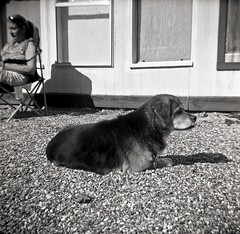Difference between revisions of "USC Reflex III"
m (Fixed link name of film type.) |
m (Added 1 image.) |
||
| Line 36: | Line 36: | ||
The Reflex III used 620 roll film and resembled a twin lens reflex camera. On top, there was a cover which could be tilted up forward to reveal the viewfinder. It was meant to be held around the user's waiste and you would look down into the viewfinder to compose your subject. The camera was made out of plastic but featured a hotshoe on the left that could accept a matching flash unit. It was powered by two AA batteries, which were loaded through a cover on the lower right side of the camera's body. | The Reflex III used 620 roll film and resembled a twin lens reflex camera. On top, there was a cover which could be tilted up forward to reveal the viewfinder. It was meant to be held around the user's waiste and you would look down into the viewfinder to compose your subject. The camera was made out of plastic but featured a hotshoe on the left that could accept a matching flash unit. It was powered by two AA batteries, which were loaded through a cover on the lower right side of the camera's body. | ||
| + | {{Flickr_image | ||
| + | |image_source= http://www.flickr.com/photos/49656291@N00/5444258960/ | ||
| + | |image= http://farm6.static.flickr.com/5018/5444258960_dfaf111876_m.jpg | ||
| + | |image_align= left | ||
| + | |image_text= Image taken with a Reflex III | ||
| + | |image_by= Kenneth Dwain Harrelson | ||
| + | |image_rights= | ||
| + | }} | ||
<br clear="all"> | <br clear="all"> | ||
Revision as of 06:55, 14 February 2011
| USC Reflex III |
|---|
|
Manufacturer: United States Camera
Film type: 620 roll film
|
The Reflex III was made by the United States Camera company, which was located on 17 North Loomis Street, Chicago, Illinois U.S.A.
Design
The Reflex III used 620 roll film and resembled a twin lens reflex camera. On top, there was a cover which could be tilted up forward to reveal the viewfinder. It was meant to be held around the user's waiste and you would look down into the viewfinder to compose your subject. The camera was made out of plastic but featured a hotshoe on the left that could accept a matching flash unit. It was powered by two AA batteries, which were loaded through a cover on the lower right side of the camera's body.

|
| Image taken with a Reflex III image by Kenneth Dwain Harrelson |
